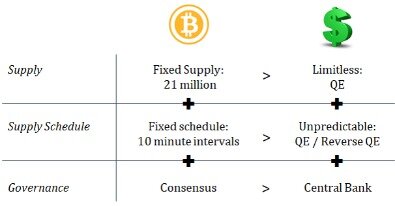Content
Later cryptocurrencies haven’t done any better — when Ethereum took cryptocurrency and added smart contracts, the very first contracts people wrote were chain letters, lotteries and automatic Ponzi schemes. Blockchain is the supposedly revolutionary technology which advocates say will transform finance and business. In essence, it is supposed to create a decentralised distribution chain – creating simultaneous copies of batches of data or transactions. The theory is that this eliminates fraud and allows companies and individuals to create more secure ways of doing business with each other that need not involve conventional banks. No matter how much investors become knowledgeable about cryptos, they are susceptible to scams. The other reason for the success of such schemes is the ability to leverage emotions.
- Governments have no control over it, it pays no income and there is a limited supply of it.
- It differs from the US dollar as fiat, which is underpinned by the gross domestic product of the country, its resources, assets and taxation revenues and capabilities.
- It’s been a rollercoaster couple of years for cryptocurrencies, but 2019 has been a fruitful one for Bitcoin holders.
- Then it hit a new record high (US$48,000) after Tesla said it had bought about US$1.5 billion of the cryptocurrency.
- If someone is convicted of a cybercrime against you, the court may order them to pay you compensation.
Here, the scammers will impersonate a celebrity or other notable person and announce that they’re giving away a lot of cryptocurrency for free, as long as you send them some cryptocurrency first. The tried-and-tested “Nigerian prince” scam has also migrated into the world of cryptocurrency. Are there any negative reviews and, if so, what do they say?
Some think of it as the future of money, others claim it is a giant Ponzi or pyramid scheme, duping the trusting and the gullible. January saw Bitcoin’s price climb far above any previous record it had achieved. Then it hit a new record high (US$48,000) after Tesla said it had bought about US$1.5 billion of the cryptocurrency. With Facebook about to launch its own coin in 2020, there is more investment in the eco-structure of cryptocurrency than any known Ponzi scheme. The question is whether to jump on board now in the hope of gaining the most benefits, or wait to test the waters. Fraudsters now use platforms such as Facebook, Instagram and Twitter to lure people into investing in cryptocurrencies, foreign exchange and binary options.
Martin Lewis’ Advice On Bitcoin: Should You Buy It?
But the authorities all over the world have been slow to react, partly because the whole area of cryptocurrencies is relatively new. The stranger was Timothy Curry, a Bitcoin enthusiast and cryptocurrency advocate.

Bitcoin is probably the most well-known cryptocurrency but they come in many forms which include Ethereum, Ripple, Litecoin and Bitcoin Cash. These are all types of digital or virtual currency collectively known as cryptocurrencies. There are literally hundreds of different cryptocurrencies available, and all have different values.
Advice For Victims Of Bitcoin Fraud
The upward price effect is amplified when interest rates go lower. The opportunity cost of owning gold, which pays no income, decreases as yields fall on rival “safe” investments such as bonds and cash saving accounts. Understanding why people buy gold is critical to understanding why people buy Bitcoin. Gold is considered a hedge against inflation as its supply is more or less fixed, whereas governments can print more money. If the money supply rises, as is happening with stimulus packages today funded by borrowing, then gold becomes more valuable. Initially, Bitcoin was a perfect way for criminals to launder money rather than it being a practical rival to traditional money.
The instability of cryptocurrencies does means that it’s possible to make huge gains with small amounts of investments. But it’s also possible to make huge losses in a relatively short space of time. To store and use your cryptocurrency you’ll usually need a specialised ‘wallet’ which will have its own unique digital address, allowing you to send and receive cryptocurrencies. Mining involves teams of computers solving mathematical problems. When the problem is solved, tokens for whichever cryptocurrency was being worked on are created, for example a bitcoin, and the computer that got the solution gets the new token. A blockchain is a historical record of each transaction verified by each computer in the network. The verification is done after every transaction, for example when a cryptocurrency was sold and which account was credited.
It is equally likely that increasing numbers of “serious” investors will start buying cryptocurrencies as part of their investment portfolios to hedge against rising inflation. Then once a number of major players are onboard, a flood of new money could flow into Bitcoin, driving up its price. First of all, there is no shame in being the victim of one of these sophisticated and predatory operations.
(For example, does it claim you’ll be able to double your investment?) This should raise a big red flag and is a common indicator of a scam. Unsure whether a particular crypto website is a scam or not? Use this checklist to help sort legitimate providers from those platforms you’re better off avoiding altogether.
How To Add Bitcoin To Your Isa And Profit Tax
From badly coded exchanges to scammer-created digital wallets, crypto is full of opportunities to lose everything. More Bitcoin was traded on May 12th than any other day in history – with over USD 29 Billion. The BTC dominance in the market of cryptocurrencies is at an all-time high of 58.9% across the market cap of all cryptocurrencies. Ultimately, some of technology’s brightest and best are jumping aboard the Blockchain and cryptocurrency bandwagon. In 2017, she launched the UK/Singapore based mobile and video token ecosystem – BOLT. Always check the investment is legitimate before handing over any money.
He said that around the end of March 2019, Mr Rezaie mentioned a ‘buy back’ scheme where people would be able to sell the coins back to Lyfcoin, but this failed to materialise. Alarm bells started ringing when investors were told they were no longer able to cash-in their investment after five months. Even now, users are unable to buy goods and services with the coins as they were led to believe and can’t sell them on an independent exchange like they can with Bitcoin and other legitimate cryptocurrencies. The theory is logical but in reality there is no correlation between the price of Bitcoin and the price of gold. What really drives its price, according to investment manager Fidelity, is simply human interest in Bitcoin.

Sooner or later, the scheme collapses when the promoter runs off with the money or it becomes too difficult to lure new investors. These types of pyramid schemes are nothing new and can be easy to spot, but that hasn’t stopped some crypto buyers being scammed in a handful of high-profile incidents. This has led to the rise of fake ICOs which, with some slick marketing and a little bit of hype, can convince people to buy a cryptocurrency that doesn’t actually exist. For example, one report found that 78% of ICOs in 2017 were scams, while a separate report put that figure at above 80%. This scam is all about quickly rushing victims into a bad decision by making them think they’re missing out. A typical giveaway scam always specifies a total amount of cryptocurrency, such as “5,000 ETH giveaway” and then uses an army of bots and fake accounts to make it look like people are actually receiving money. Ponzi scams usually involve making strong or unrealistic claims about the returns you are able to make by investing in cryptocurrencies.
The scammers often have convincing social media profiles or websites with bogus reviews. If you don’t understand a cryptocurrency or an investment, avoid it. Quick transaction times is one of the reasons people like cryptocurrencies. But, cryptocurrencies also allow you to pay for or sell something anonymously, so they also appeal to scammers and shady online dealers. Something about cryptocurrencies attracts, not just starry-eyed naïfs, but the sort of starry-eyed naïf who thinks that Ponzis, chain letters and other blatantly fraudulent financial schemes are actually a good idea.
The prevalence of such market exposes users to frauds and other scams. The first one is the lack of knowledge of the crypto operations. Being a new sector, investors are yet to understand everything there is to know about the coins. They are likely to fall for any site that offers returns on the coin investments. With the crypto market booming after the pandemic, most people are likely to consider it as an investment portfolio. The decline of the mainstream economy will also encourage people to look to crypto as the best alternative. Even though some of the people behind the scam are already arrested, there are still others using the platform to channel money out.
The questionable investment could be advertised on social media or in a pamphlet. The FCA also has a warning list so you can check if you’re dealing with a known scam. In the UK, a firm must be authorised and regulated by the FCA to do most financial services activities.
The first scam on the list is one that you may well be familiar with already, as it’s also been widely used to target customers in the UK. Did you first hear about it on social media, or did they approach you first? Social media and unsolicited messages are common ways for scammers to reach new victims.
Do you have to pay taxes on Bitcoin?
Under U.S. tax law, bitcoin and other cryptocurrencies are classified as property and subject to capital gains taxes. But you only owe taxes when those gains are realized.
All of them were “very up-tempo, full of beans, full of passion”, she remembers. “You are so lucky that you’re seeing this webinar right now,” she was told. “You’re in at such an early stage and it’s just going to go like Bitcoin. It’s going to go bigger.”
Investment scams are getting harder to spot but there are some telltale signs to help protect your hard-earned money. I do not hold a position in any crypto asset or cryptocurrency or blockchain company. Crypto is another idea that works great in a perfect world, with everything held constant.
But it seems it’s not just the promise of riches that keeps people believing. After Jen McAdam invested into OneCoin she was constantly told she was part of the OneCoin “family”. She was entered into a Whatsapp group, with its own “leader” who disseminated information from the headquarters in Sofia. And McAdam’s leader prepared her carefully for conversations with OneCoin sceptics. “You’re told not to believe anything from the ‘outside world’,” she recalls. “That’s what they call it. ‘Haters’ – Bitcoiners are ‘haters’. Even Google – ‘Don’t listen to Google!'” Any criticism or awkward questions were actively discouraged. “If you have any negativity you should not be in this group,” she was told.
At the time of arrest, they had already siphoned more than $185m. One of the biggest scams in the crypto sector is the last year’s PlusToken that was outed after scamming users of around $2bn. Several investors are looking to it as one of the best investment portfolios of 2020. Once the white papers are produced you’d then create a team of developers, coders, PRs etc and engage with exchanges that allow customers to trade cryptocurrencies. Once you meet certain criteria, like liquidity, you can launch your cryptocurrency and increase the supply of coins as demand grows. Although investors saw the notional value of their investment soar on their computer screen it didn’t reflect any true value because it was just a price made up in Bulgaria, where OneCoin was headquartered. Investment scams fall under the remit of the FMA, while pyramid schemes are prohibited by the Fair Trading Act, which is enforced by the Commerce Commission.









